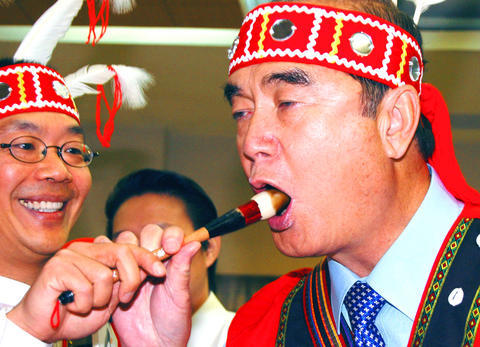The Hualien County Government's Agriculture Bureau formed an alliance with the Su Hang restaurant chain in Taipei yesterday to promote non-toxic farming and the idea of sustainable development.
Lin Ching-shuei (
The Su Hang restaurant is famous for its Jiangsu-Zhejiang cuisine.

PHOTO: CNA
"We hope that the general public will associate products of non-toxic farming with `health and quality,'" he added. "We expect this kind of cooperation will create a win-win situation for consumers, restaurants and farmers."
Non-toxic farming in Taiwan was launched by Hualien County Commissioner Hsieh Shen-shan (謝深山) in 2004 to provide agricultural products that are grown organically without synthetic fertilizers, pesticides or livestock feed additives. The certification process is in accordance with legal standards to maintain soil productivity and control pests.
There are several differences between organic farming and non-toxic farming -- regular tests are carried out by 15 qualified inspectors on the farms rather than having samples submitted by farmers themselves as is the case with organic farming testing.
In addition, all products must pass an examination 10 days before going to market. Non-toxic farming includes agriculture, fish and livestock, while organic farming focuses more on agricultural products.
"There are three goals of promoting non-toxic farming -- to let consumers eat healthy food, to protect the environment and to help agricultural transformation," said Chen Hsiou-ching (
She said non-toxic agriculture is high-quality agriculture that not only guarantees an income for farmers but also pushes the economic development of Hualien County.
"It is also a concept of sustainable development," she said, adding that "with the increased incomes, more and more farmers will want to become involved in non-toxic farming and therefore our environment will improve."
Besides "green" agricultural methods, all products of non-toxic farming use environmentally friendly packaging materials such as polylactic acid (PLA), a biodegradable resin that is derived from cornstarch.
Chen said that every product has an agricultural practice certificate in the form of a sticker that shows the traceability of the product -- who grew it, and when and how it was made.
"By knowing where the product comes from, consumers feel safer and many of them have become regular customers," she went on.
Chen added that the non-toxic farming project has also generated a surprising windfall, in that "many farmers gain an enormous sense of accomplishment after switching to non-toxic farming because they are playing the role of a `food doctor,' providing healthier food to their customers."

Alain Robert, known as the "French Spider-Man," praised Alex Honnold as exceptionally well-prepared after the US climber completed a free solo ascent of Taipei 101 yesterday. Robert said Honnold's ascent of the 508m-tall skyscraper in just more than one-and-a-half hours without using safety ropes or equipment was a remarkable achievement. "This is my life," he said in an interview conducted in French, adding that he liked the feeling of being "on the edge of danger." The 63-year-old Frenchman climbed Taipei 101 using ropes in December 2004, taking about four hours to reach the top. On a one-to-10 scale of difficulty, Robert said Taipei 101

Nipah virus infection is to be officially listed as a category 5 notifiable infectious disease in Taiwan in March, while clinical treatment guidelines are being formulated, the Centers for Disease Control (CDC) said yesterday. With Nipah infections being reported in other countries and considering its relatively high fatality rate, the centers on Jan. 16 announced that it would be listed as a notifiable infectious disease to bolster the nation’s systematic early warning system and increase public awareness, the CDC said. Bangladesh reported four fatal cases last year in separate districts, with three linked to raw date palm sap consumption, CDC Epidemic Intelligence

Two Taiwanese prosecutors were questioned by Chinese security personnel at their hotel during a trip to China’s Henan Province this month, the Mainland Affairs Council (MAC) said yesterday. The officers had personal information on the prosecutors, including “when they were assigned to their posts, their work locations and job titles,” MAC Deputy Minister and spokesman Liang Wen-chieh (梁文傑) said. On top of asking about their agencies and positions, the officers also questioned the prosecutors about the Cross-Strait Joint Crime-Fighting and Judicial Mutual Assistance Agreement, a pact that serves as the framework for Taiwan-China cooperation on combating crime and providing judicial assistance, Liang

US climber Alex Honnold left Taiwan this morning a day after completing a free-solo ascent of Taipei 101, a feat that drew cheers from onlookers and gained widespread international attention. Honnold yesterday scaled the 101-story skyscraper without a rope or safety harness. The climb — the highest urban free-solo ascent ever attempted — took just more than 90 minutes and was streamed live on Netflix. It was covered by major international news outlets including CNN, the New York Times, the Guardian and the Wall Street Journal. As Honnold prepared to leave Taiwan today, he attracted a crowd when he and his wife, Sanni,